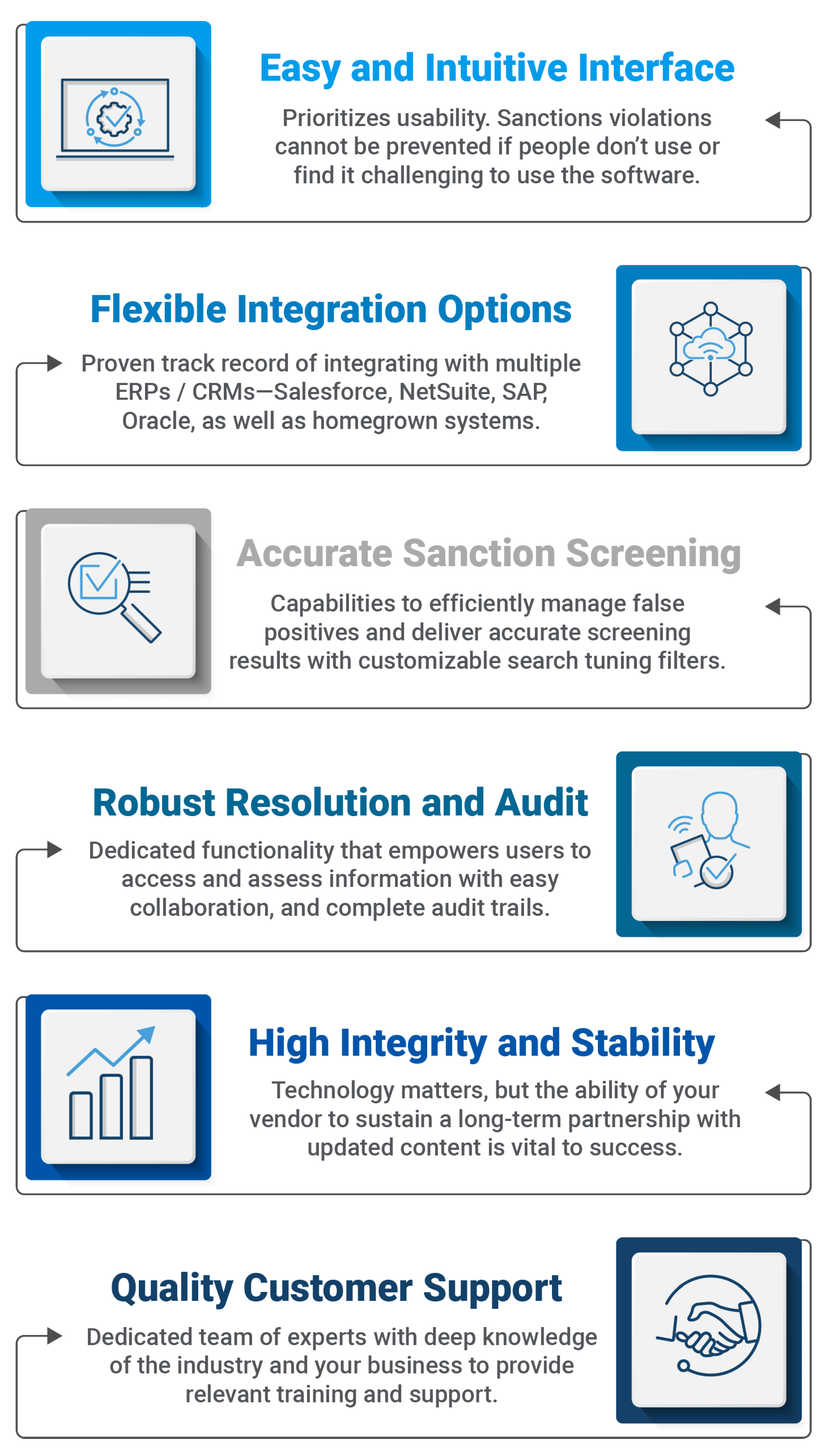Today’s global businesses are under pressure to deliver growth while navigating significant political and regulatory challenges.
A core element of maintaining compliance with increasing sanctions and third-party restrictions is undertaking robust due diligence activities.
This due diligence must include screening for denied parties on a daily basis as your organization engages with prospects, customers, suppliers, resellers, logistics providers, and other critical partners to your business. This task even extends to vetting new hires, contractors, and visitors to your offices and facilities to ensure that no potential gaps are overlooked. To do this effectively requires modern solutions that can streamline and simplify this complex process. But how do you determine the best denied party screening solution for your business?
This article focuses specifically on researching for denied party screening software and assumes that the usual procurement or outsourcing steps are taken including having a clear objective, creating a list of software requirements, and talking with at least three vendors, among others.
Here are 6 key factors to consider as you evaluate restricted party screening technology solutions, with a view towards implementing a best-in-class solution for your organization.

6 Considerations for Choosing the Best-in-Class Denied Party Screening Software Solution

In This Article:
- Company Size and Stability of a Sanction Screening Software Vendor
- Denied Party Screening Software with a Modern and Intuitive User Interface
- Sophisticated Search Tuning Capabilities to Reduce False Positives
- Denied Party Screening Software with Robust Adjudication & Audit Functionality
- Flexible Denied Party Screening Integration & Automation options
- Best-in-Class Customer Service and Support
ONE: Company Size and Stability of a Sanction Screening Software Vendor
Compliance screening solutions to identify and remove denied, blocked, debarred, sanctioned, and other restricted individuals and parties from your business, networks, and supply chains are mission critical in today’s volatile geopolitical and regulatory environment.
Technology matters, but even more important are the people who will work with you on training, implementation, and ongoing support. Choosing a vendor who has the capability and disposition to build and sustain long-term strategic relationships with customers is an essential element in protecting your company from violations.
TIP: Look for denied party screening vendors that have been delivering compliance solutions as part of their core business over the long term. Look also for companies operating on a truly worldwide basis and with an expansive list of customers. This point cannot be understated, because organizations with a global footprint are best positioned to provide compliance content—such as OFAC sanctions lists—that is up to date, which allows for greater growth potentials.
TWO: Denied Party Screening Software with a Modern and Intuitive User Interface
Compliance screening solutions are only as good as their usability. Violations can’t be prevented if people don’t use—or find it challenging to use—the solution.
Make sure that your evaluation considers the user experience, as well as asking about the vendor’s number of customers/users, their customer satisfactions scores, and overall retention rate. This will give you good insight into the ‘staying power’ of a potential solution.
Also look for on-demand training resources like videos and FAQs that will help ensure your users always have access to help when needed.
TIP: To determine the best denied party screening software, go to G2, Capterra, and other reputable software comparison sites to evaluate the strengths and weaknesses of one vendor over another. The criteria these peer review sites use include ease of use, quality of customer service and support, value for money, and likelihood to recommend, along with a listing of top features and an overall score.
THREE: Sophisticated Search Tuning Capabilities to Reduce False Positives
The vast amount of denied party screening lists to be reviewed can create significant challenges in the form of ‘false positive’ results. These are hits that appear legitimate, but upon further review do not represent risk to your business.
The inability to minimize false positives leads to compliance teams having to review over and over again the same hits that could be managed in a different way. This results in a decrease in efficiency, productivity, and, worst of all, extended sales cycles / delayed business processes.
TIP: Look for best-in-class denied party screening solutions that have multi-factor search algorithms and configuration options that allow you to refine and focus your screening activities, thereby minimizing false positives without potentially missing legitimate hits. Also look for the capability to customize search settings based on user profile/company divisions & locations/etc., so that you are searching most effectively and efficiently based on the unique needs of your business.
Make sure that the vendor you ultimately select has top notch customer service who will get to know your business to optimize your use of the software, from onboarding and training to providing regular updates and recommending which lists you need to screen against and which you may not need to. To learn more, explore this guide on how to effectively manage false positives in denied party screening.
FOUR: Denied Party Screening Software with Robust Adjudication & Audit Functionality
The ability to review, action, and escalate potential screening hits is an essential element of an effective screening solution.
Knowing what to do and having the processes in place to deal with a hit is a critical part of the compliance process. And best-in-class vendors should have the know-how and solutions ready and at your disposal should you require them.
TIP: The best restricted party screening software solutions offer dedicated functionality that empower users and decision makers to access and assess critical information related to hits / potential hits, to collaborate with colleagues in the event that more information/insight is needed, and to capture decision criteria related to a particular transaction.
It is also of critical importance that the solution offers a complete audit trail of all screening transactions AND decisions made against hits/potential hits as an asset in the event of a compliance audit.
FIVE: Flexible Denied Party Screening Integration & Automation Options
The ability to automate denied party screening transactions so that they happen within business systems like Enterprise Resource Planning (ERP), Customer Relationship Management (CRM), and eCommerce platforms is an excellent way to reduce compliance risk while also improving business productivity.
The key benefit of integration and automation is the consistent and uniform applications of compliance processes, which greatly minimizes the chances of human error. It gives you peace of mind and allows you to focus on your main business goals and objectives.
TIP: Look for a restricted party screening solution that has proven integration capabilities (lots of customers using lots of different systems), as well as a connected decision support and audit trail module that allows hits/potential hits to be reviewed, actioned, and automatically stored.
Also review the potential vendor’s implementation approach to ensure they have the capability and capacity to collaborate with your internal IT team to deliver a successful solution.
SIX: Best-in-Class Customer Service and Support
I touched on this factor above (refer to Point 3.). Having professional customer service and support is a major component you will need to help ensure that your compliance processes are set up properly and run optimally. As mentioned, these are professionals who not only know their solutions back to front, and have expert knowledge about denied party screening requirements, they should also have the passion to get to know your business and help you get the most out of your denied party screening software subscription.
TIP: Look for vendors that have support teams in depth to help you get your compliance structure established, answer questions as they arise, and provide general support including training as you require them. Most important, make sure that are assigned a dedicated customer support representative who will respond to you in a timely manner.
The Best Denied Party Screening Solution is the One that Covers Your Compliance Needs
Hopefully these tips are useful to help you search for and select the best denied party screening software solution vendor for your compliance requirements. There are some robust technology options available on the market, but there are ones that will only be able to provide partial coverage of your compliance obligations.
Selecting the best-in-class solution undoubtedly will help you comply with screening rules and regulations. But besides streamlining the compliance process, they actually also work to enable business growth.
Descartes Denied Party Screening provides a suite of premier denied party screening software solutions that help organizations around the world reach the highest export compliance standards while reducing the risk of negative impacts to the bottom line.
But don’t take our word for it, see what users are saying about our denied party screening solutions. For more information including a demo and a trial, reach out to me directly or Contact Us.
We Answer Your Questions About Denied Party Screening
- How Much Does A Denied Party Screening Solution Cost?
- Top Red Flags to Look Out for When Selecting a Denied Party Screening Software Vendor
- How to Identify a Best-In-Class Denied Party Screening Software
- How to Manage False Positives in Denied Party Screening
- How to Effectively Compare Denied Party Screening Software Vendors
- What do Organizations in my Industry Need to be Mindful of When it Comes to Denied Party Screening and Export Compliance?
- Unforced Errors in the World of Export and International Trade Compliance Violations That You Need to Know About
- 12 Steps to Optimize Your Denied Party Screening Program
- ROI of Compliance: How Denied Party Screening Drives Value Creation for the Organization
- Top Five Best Practices to Integrated Denied Party Screening



